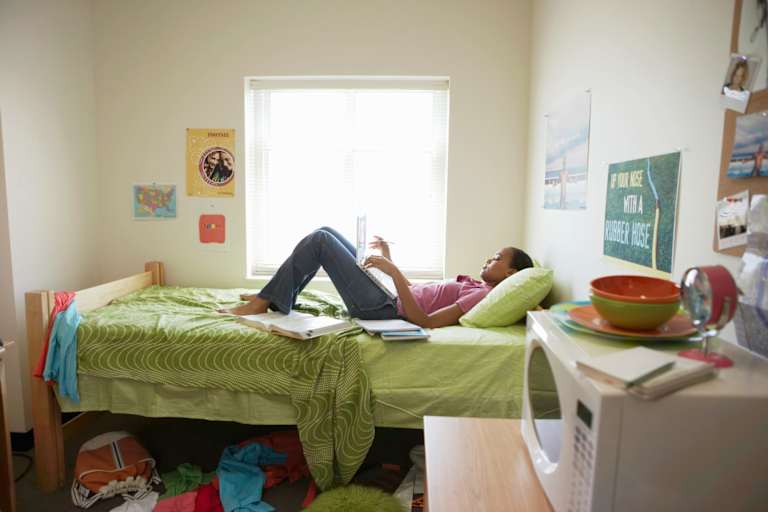The Top 5 Benefits of Living on Campus
Many colleges give their students, particularly first-year students, the option to live on campus. On-campus residences allow you to easily access classrooms, academic resources, dining halls, faculty offices, and many other facilities and amenities.
A campus environment can nurture students’ evolving worldviews and their extracurricular interests. Living on campus can give you more opportunities to socialize with your peers. You’ll also have greater access to a variety of campus activities and clubs, adding to your sense of community.
Discover the top five benefits of living on campus in college below.
1. You Can Feel More Connected to Other Students
Students who live on campus often enjoy a greater sense of community than commuters. Living close to school facilities can make it easier for you to connect with classmates through campus activities and events.
Diverse campus groups — intramural athletics, career or major associations, Greek life, and community service organizations — allow students to build more intimate networks within the larger school community.
Students living on campus can often choose from a variety of housing options as well. While some students live in traditional dorms, others may choose suite-style residences or living-learning communities. While the availability of certain housing styles varies by school, most students eventually share their living space with one or more college roommates.
Living with other students can pose challenges. If you’re living away from home for the first time, you might experience homesickness in college. Other students might have trouble coping with the lack of privacy or having to share amenities.
Despite potential obstacles, living on campus can be an enriching opportunity. You can form social bonds while enjoying your newfound independence.
2. Resident Advisors Are There to Support You
Most dorms have resident advisors (RAs), who offer support and help first-year students transition to living on campus. These seasoned students oversee the safety and well-being of residents on specific floors or within small groups. RAs often have designated “on-call” shifts to handle emergencies.
Although living in close quarters with strangers might seem intimidating, residence halls can be great social centers. RAs aim to create a welcoming space for students. They might host community-building events, for example, to encourage students to mingle with others in the same building.
On-campus living can present endless opportunities for you to make friends. Students often form close bonds with their peers in or near their living spaces.
This close proximity makes it easy to get to know your neighbors. Many choose to leave their dorm room doors open, allowing passing residents to introduce themselves and hang out. Residence halls also tend to have shared spaces and lounges where students can congregate.
3. Colleges Prioritize Student Safety
On-campus security personnel is another big benefit to living on campus.
College students, especially those adjusting to being away from home for the first time, might worry about their safety on campus. To maintain a safe environment, colleges usually employ security personnel to prevent misconduct and respond to emergencies.
Security personnel are normally positioned around residence halls, academic buildings, and other campus facilities. Their job is to look out for illegal substance use and high-risk activities to ensure students stay safe at parties, sporting events, and other social gatherings.
Some schools offer shuttle services for students who feel uncomfortable walking across campus, particularly at night.
In emergency situations, you can contact security by phone or text. Many schools have blue light systems, which allow students in crisis to alert security from an array of locations without having to dial a phone number.
4. You’ll Minimize the Stress of Commuting
Balancing academic obligations and transportation can be challenging. But living near classrooms and other campus facilities can eliminate the stress of commuting.
However, not all campus housing is located within walking distance of academic buildings. To address this issue, some colleges offer a free bus system or shuttle.
Commuters may face issues just getting to campus. For example, many off-campus residents must navigate the logistics and reliability of public transportation. Students with cars must also follow a school’s protocols. Some institutions charge parking fees, whereas others may not allow students to have cars on campus at all.
5. Meal Plans Save You Time
Not all on-campus housing facilities come with kitchens. Many students living in dorms rely on dining halls and other campus food vendors. Residents typically purchase meal plans, which provide a set number of visits to dining halls or credits to spend on food items.
Campus dining can be a time-saving resource that spares you from having to buy groceries and cook regular meals. What’s more, many students say campus dining halls are among their favorite places to socialize.
Today, many colleges cater to students with an array of dietary restrictions, offering vegan, vegetarian, gluten-free, and kosher options.
Frequently Asked Questions About Living on Campus
With greater access to classes, faculty, and study groups, students living on campus may earn better grades than those who commute to class.
Some surveys and studies suggest a correlation between on-campus residence and higher GPAs. For example, according to a 2012 study conducted by a student at Brigham Young University, commuters were almost twice as likely to earn a GPA below 1.0 as on-campus students.
The affordability of on-campus living largely depends on the school, your area’s cost of living, your lifestyle, and whether you have roommates. For example, it may be cheaper to live on campus if you’re attending school in a city with a high cost of living, such as New York. By contrast, it may be cheaper to live off campus if you’re attending school in a more rural area where rent is typically cheaper.
Take time to compare the yearly cost of room and board at your college with an average year’s worth of rent for an off-campus space to estimate any potential savings.




